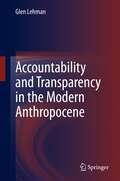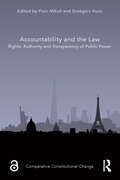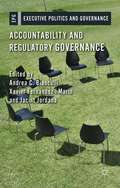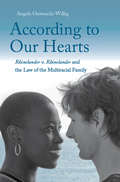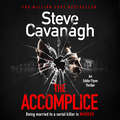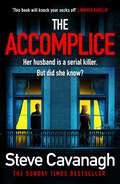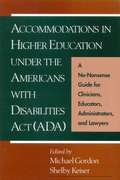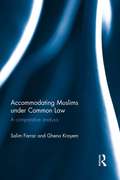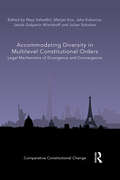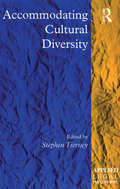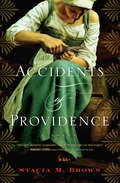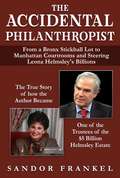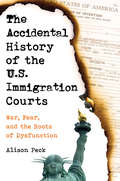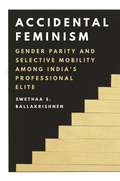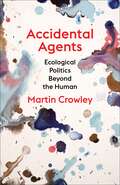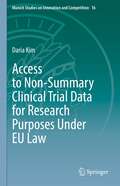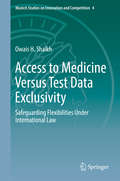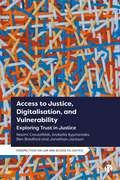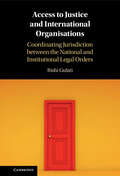- Table View
- List View
Accountability and Transparency in the Modern Anthropocene
by Glen LehmanThe book is about accountability processes and how they contribute solutions to our current environmental and global political problems. This book is different to other literature in this field. This is so because the dominant accountability discourse is shaped by what is defined as a neoliberal business case for social and environmental reform. This book assumes a nirvana stance within globalisation where all citizens operate within the parameters of the free market and will recover from adverse economic and political damage. Further this book uses neoliberalism and free-market reforms aims as examples to implement efficient management technologies and create more competitive pressures. Central to the argument of the book are perspectives on authenticity, expressivism and interpretivism which are found to provide a radical reworking of our understanding of being in the world. These frameworks offer a starting point for rethinking the way individuals, businesses and communities ought to be dealing politically with accountability and ecological crises. The argument builds to an accountability perspective that utilises work from expressivism, interpretivism, classical liberalism and postmodern theory. The theoretical quest undertaken in this book is to develop connections between accountability, democratic, ethical and ecological perspectives.
Accountability and the Law: Rights, Authority and Transparency of Public Power (ISSN)
by Piotr Mikuli Grzegorz KucaThis book discusses contemporary accountability and transparency mechanisms by presenting a selection of case studies.The authors deal with various problems connected to controlling public institutions and incumbents’ responsibility in state bodies. The work is divided into three parts. Part I: Law examines the institutional and objective approach. Part II: Fairness and Rights considers the subject approach, referring to a recipient of rights. Part III: Authority looks at the functional approach, referring to the executors of law. Providing insights into increasing understanding of various concepts, principles, and institutions characteristic of the modern state, the book makes a valuable contribution to the area of comparative constitutional change.It will be a valuable resource for academics, researchers, and policy-makers working in the areas of constitutional law and politics.
Accountability and the Law: Rights, Authority and Transparency of Public Power (Comparative Constitutional Change)
by Piotr Mikuli; Grzegorz KucaThis book discusses contemporary accountability and transparency mechanisms by presenting a selection of case studies. The authors deal with various problems connected to controlling public institutions and incumbents’ responsibility in state bodies. The work is divided into three parts. Part I: Law examines the institutional and objective approach. Part II: Fairness and Rights considers the subject approach, referring to a recipient of rights. Part III: Authority looks at the functional approach, referring to the executors of law. Providing insights into increasing understanding of various concepts, principles, and institutions characteristic of the modern state, the book makes a valuable contribution to the area of comparative constitutional change. It will be a valuable resource for academics, researchers, and policy-makers working in the areas of constitutional law and politics.
Accountability and Regulatory Governance
by Andrea C. Bianculli Xavier Fern�ndez-i-Mar�n Jacint JordanaThis collection improves our understanding of the problems associated to accountability in regulatory governance, focusing on audiences, controls and responsibilities in the politics of regulation and through a systematic exploration of the various mechanisms through which accountability in regulatory governance
According to Our Hearts
by Angela Onwuachi-WilligThis landmark book looks at what it means to be a multiracial couple in the United States today. According to Our Hearts begins with a look back at a 1925 case in which a two-month marriage ends with a man suing his wife for misrepresentation of her race, and shows how our society has yet to come to terms with interracial marriage. Angela Onwuachi-Willig examines the issue by drawing from a variety of sources, including her own experiences. She argues that housing law, family law, and employment law fail, in important ways, to protect multiracial couples. In a society in which marriage is used to give, withhold, and take away status--in the workplace and elsewhere--she says interracial couples are at a disadvantage, which is only exacerbated by current law.
The Accomplice: THE INSTANT SUNDAY TIMES TOP TEN BESTSELLER (Eddie Flynn Series)
by Steve CavanaghThe new Eddie Flynn novel from the Sunday Times and million copy bestselling author of THIRTEEN, FIFTY FIFTY and THE DEVIL'S ADVOCATE.'This guy is the real deal. Trust me.' LEE CHILD 'Top notch thrills and courtroom drama' SHARI LAPENA 'A terrific writer. He has talent to burn.' DON WINSLOW'Just when you thought there were no new twists to bring to the legal thriller, Cavanagh comes along and knocks your socks off. The high courts meet high concepts.' LINWOOD BARCLAY THE MOST HATED WOMAN IN AMERICAThe Sandman killings have been solved. Daniel Miller murdered fourteen people before he vanished. His wife, Carrie, now faces trial as his accomplice. The FBI, the District Attorney, the media and everyone in America believe she knew and helped cover up her husband's crimes.THE LAWYEREddie Flynn won't take a case unless his client is innocent. Now, he has to prove to a jury, and the entire world, that Carrie Miller was just another victim of the Sandman. She didn't know her husband's dark side and she had no part in the murders. But so far, Eddie and his team are the only ones who believe her.THE FORMER FBI AGENTGabriel Lake used to be a federal agent, before someone tried to kill him. Now, he's an investigator with a vendetta against the Sandman. He's the only one who can catch him, because he believes that everything the FBI knows about serial killers is wrong.THE KILLERWith his wife on trial, the Sandman is forced to come out of hiding to save her from a life sentence. He will kill to protect her and everyone involved in the case is a target.Even Eddie Flynn...
The Accomplice: The gripping, must-read thriller (Eddie Flynn Series)
by Steve CavanaghThe new Eddie Flynn novel from the Sunday Times and million copy bestselling author of THIRTEEN, FIFTY FIFTY and THE DEVIL'S ADVOCATE.'This guy is the real deal. Trust me.' LEE CHILD 'Top notch thrills and courtroom drama' SHARI LAPENA 'A terrific writer. He has talent to burn.' DON WINSLOWDaniel Miller murdered fourteen people before he vanished. His wife, Carrie, now faces trial as his accomplice. The FBI, the District Attorney, the media and everyone in America believe she knew and helped cover up her husband's crimes.Eddie Flynn won't take a case unless his client is innocent. Now, he has to prove to a jury, and the entire world, that Carrie Miller didn't know her husband's dark side. But so far, Eddie and his team are the only ones who believe that she had no part in the murders.With his wife on trial, Daniel Miller is forced to come out of hiding to save her from a life sentence. He will kill to protect her and everyone involved in the case is a target.Even Eddie Flynn...
The Accomplice: The gripping, must-read thriller (Eddie Flynn Series)
by Steve CavanaghThe new Eddie Flynn novel from the Sunday Times and million copy bestselling author of THIRTEEN, FIFTY FIFTY and THE DEVIL'S ADVOCATE.'This guy is the real deal. Trust me.' LEE CHILD 'Top notch thrills and courtroom drama' SHARI LAPENA 'A terrific writer. He has talent to burn.' DON WINSLOWDaniel Miller murdered fourteen people before he vanished. His wife, Carrie, now faces trial as his accomplice. The FBI, the District Attorney, the media and everyone in America believe she knew and helped cover up her husband's crimes.Eddie Flynn won't take a case unless his client is innocent. Now, he has to prove to a jury, and the entire world, that Carrie Miller didn't know her husband's dark side. But so far, Eddie and his team are the only ones who believe that she had no part in the murders.With his wife on trial, Daniel Miller is forced to come out of hiding to save her from a life sentence. He will kill to protect her and everyone involved in the case is a target.Even Eddie Flynn...
Accommodations in Higher Education under the Americans with Disabilities Act: A No-Nonsense Guide for Clinicians, Educators, Administrators, and Lawyers
by Michael Gordon Shelby Keiser Alta LapointThis manual outlines how the ADA applies to a wide range of mental and physical impairments within higher education settings, it outlines a series of fundamental principles and actual clinical/administrative procedure
Accommodating Muslims under Common Law: A Comparative Analysis
by Salim Farrar Ghena KrayemThe book explores the relationship between Muslims, the Common Law and Sharīʽah post-9/11. The book looks at the accommodation of Sharīʽah Law within Western Common Law legal traditions and the role of the judiciary, in particular, in drawing boundaries for secular democratic states with Muslim populations who want resolutions to conflicts that also comply with the dictates of their faith. Salim Farrar and Ghena Krayem consider the question of recognition of Sharīʽah by looking at how the flexibilities that exists in both the Common Law and Sharīʽah provide unexplored avenues for navigation and accommodation. The issue is explored in a comparative context across several jurisdictions and case law is examined in the contexts of family law, business and crime from selected jurisdictions with significant Muslim minority populations including: Australia, Canada, England and Wales, and the United States. The book examines how Muslims and the broader community have framed their claims for recognition against a backdrop of terrorism fears, and how Common Law judiciaries have responded within their constitutional and statutory confines and also within the contemporary contexts of demands for equality, neutrality and universal human rights. Acknowledging the inherent pragmatism, flexibility and values of the Common Law, the authors argue that the controversial issue of accommodation of Sharīʽah is not necessarily one that requires the establishment of a separate and parallel legal system.
Accommodating Diversity in Multilevel Constitutional Orders: Legal Mechanisms of Divergence and Convergence (Comparative Constitutional Change)
by Maja Sahadžic Marjan Kos Jaka Kukavica Jakob Gašperin Wischhoff Julian ScholtesThis book offers insights into the legal mechanisms that are adopted in multilevel constitutional orders to accommodate the tension between contrasting interests of diversity and unity and the converging or diverging effects they may have on the functioning of a multilevel constitutional order. It does so by targeting mainly the European experience but also drawing insights from other jurisdictions. The volume draws on a well-rounded theoretical framework that allows a comprehensive discussion of the dialectics in multi-level systems.) It focuses on two of the most relevant areas of constitutional law, namely the setup of supranational institutions and the protection of fundamental human rights. Finally, the work presents a fresh legal take on the unity-diversity dichotomy. This collection is ideal for academics working in the fields of constitutional law, international law, federal theory, institutional design, management and accommodation of diversity, and protection of fundamental rights. Political scientists will also find the discussions very relevant as a foundation for further research in their field. Policymakers involved in constitutional engineering will be interested, as mechanisms of accommodation, convergence, and divergence are increasingly looked at as devices for managing multilevel polities.
Accommodating Cultural Diversity (Applied Legal Philosophy)
by Stephen TierneyThis volume explores recent developments in the theory and practice of accommodating cultural diversity within democratic constitutional orders. The aim of the book is to provide a broad vision of the constitutional management of cultural diversity as seen through the prisms of different disciplines and experiences, both theoretical and practical. The contributions, which come from Canada and Europe, comprise a review of the evolving theory of cultural diversity, followed by two main case studies: a substantive study of the accommodation of indigenous peoples within different constitutional orders and, secondly, the importance of constitutional interpretation to the development of cultural diversity in complex pluralist democracies such as Australia, Canada and the UK.
Accidents of Providence: A Novel
by Stacia M. Brown&“A seventeenth-century heroine for our times&” could face death for her dangerous affair with an English revolutionary (O, The Oprah Magazine). London, 1649. King Charles has been beheaded for treason; Cromwell is in power; paranoia and self-righteousness rule; and glove maker Rachel Lockyer has been engaged in a secret affair with William Walwyn, a Leveler who advocates for independence and tolerance. But when Rachel&’s &“bastard&” infant is found hidden in the woods, Rachel is arrested. No one disputes that the young mother buried her beloved daughter. The question that has brought Rachel to trial for murder is: why? Now drawn into Rachel&’s circle is the married lover she is loathe to reveal; a fiercely compassionate mother who lost her own children to smallpox; a prosecutor hell-bent on making an example of Rachel; and the criminal investigator, increasingly reluctant to build his case against the condemned young woman—all of them brought to reckon for this one life. At once a remarkable love story and a breathtaking thriller based on true events, Accidents of Providence is &“heart-poundingly vivid [and] intellectually provocative . . . historical fiction at its best&” (Kirkus Reviews, starred review). &“[A] delightfully seditious heroine . . . Proof that a historical novel can be educational and entertaining.&” —O, The Oprah Magazine &“Wonderfully detailed and keenly researched, it is a moving portrait of a courageous woman caught between a disastrous affair with a charismatic revolutionary and the draconian laws of the land that would put her to death because of it.&” —Kathleen Kent, author of The Traitor&’s Wife
The Accidental Philanthropist: From A Bronx Stickball Lot to Manhattan Courtrooms and Steering Leona Helmsley's Billions
by Sandor FrankelThe True Story of an Extraordinary Journey from the Bronx to the Helm of the $5 Billion Helmsley Charitable Trust, Doling Out Unimaginable Amounts of Money for the Good of the World. The Author met his client in the prison&’s visitors&’ room: he, the lawyer, and she, his client, now being patted down by a guard following the first night of a four-year sentence. Identified here by an inmate number, she was known worldwide: the notorious Leona Helmsley, owner of a gargantuan real estate portfolio; the woman who had reputedly scoffed &“Only the little people pay taxes"; the &“queen of mean&” whom Newsweek described as &“rhymes with rich.&” Wolfing down popcorn the author bought her from the prison vending machine, she was one of the most maligned people on the planet. What he saw, though, was a frightened 71-year-old inmate, alone and in need of something altogether absent from her life: someone she could trust. In her eyes, he was perhaps the closest thing. Two years earlier, he had joined her legal team following her conviction for tax crimes. Just two days before, in her sumptuous Manhattan penthouse, she ferociously fired one lawyer while the others quit. He was the last man standing. In time, he became not just her go-to lawyer but her consigliere. He now had to deal with the countless people trying to dip a pinky or a shovel into her fortune. She also presented him with a host of personal issues. Ultimately, she named him as one of her executors, charged with overseeing and liquidating her multi-billion dollar estate, and also one of the trustees of a charitable trust she would fund &“to improve lives…around the world.&” That is how, on Leona Helmsley&’s death in 2007, the author became a steward of her $5 billion fortune, which he and his co-trustees were duty-bound to give away to causes and recipients they alone would determine. Little in his life had prepared him for such a role. He grew up in a lower middle-class section of the Bronx, wound up at Harvard Law School, and built a successful career as a trial lawyer, representing some of the rich and famous and some ordinary folks. But overseeing perhaps the largest private real estate empire in the country, selling all those properties and the assorted bonds, diamonds, and other playthings of the rich, and choosing the goals of a vast charitable trust funded with those sales&’ proceeds, was something else altogether. He tasted the nectar of instant popularity, and became incontrovertible proof that when you control billions of dollars, you become wittier, funnier, far more profound than you&’ve ever been, and always worth listening to. Friends, pseudo-friends, former friends, would-be friends, quasi friends, friends of friends—everyone comes knocking. The Accidental Philanthropist tells how all this happened.
The Accidental History of the U.S. Immigration Courts: War, Fear, and the Roots of Dysfunction
by Alison PeckHow the immigration courts became part of the nation’s law enforcement agency—and how to reshape them. During the Trump administration, the immigration courts were decried as more politicized enforcement weapon than impartial tribunal. Yet few people are aware of a fundamental flaw in the system that has long pre-dated that administration: The immigration courts are not really "courts" at all but an office of the Department of Justice—the nation’s law enforcement agency. This original and surprising diagnosis shows how paranoia sparked by World War II and the War on Terror drove the structure of the immigration courts. Focusing on previously unstudied decisions in the Roosevelt and Bush administrations, the narrative laid out in this book divulges both the human tragedy of our current immigration court system and the human crises that led to its creation. Moving the reader from understanding to action, Alison Peck offers a lens through which to evaluate contemporary bills and proposals to reform our immigration court system. Peck provides an accessible legal analysis of recent events to make the case for independent immigration courts, proposing that the courts be moved into an independent, Article I court system. As long as the immigration courts remain under the authority of the attorney general, the administration of immigration justice will remain a game of political football—with people’s very lives on the line.
Accidental Feminism: Gender Parity and Selective Mobility among India’s Professional Elite
by Swethaa S. BallakrishnenExploring the unintentional production of seemingly feminist outcomes In India, elite law firms offer a surprising oasis for women within a hostile, predominantly male industry. Less than 10 percent of the country’s lawyers are female, but women in the most prestigious firms are significantly represented both at entry and partnership. Elite workspaces are notorious for being unfriendly to new actors, so what allows for aberration in certain workspaces?Drawing from observations and interviews with more than 130 elite professionals, Accidental Feminism examines how a range of underlying mechanisms—gendered socialization and essentialism, family structures and dynamics, and firm and regulatory histories—afford certain professionals egalitarian outcomes that are not available to their local and global peers. Juxtaposing findings on the legal profession with those on elite consulting firms, Swethaa Ballakrishnen reveals that parity arises not from a commitment to create feminist organizations, but from structural factors that incidentally come together to do gender differently. Simultaneously, their research offers notes of caution: while conditional convergence may create equality in ways that more targeted endeavors fail to achieve, “accidental” developments are hard to replicate, and are, in this case, buttressed by embedded inequalities. Ballakrishnen examines whether gender parity produced without institutional sanction should still be considered feminist.In offering new ways to think about equality movements and outcomes, Accidental Feminism forces readers to critically consider the work of intention in progress narratives.
Accidental Agents: Ecological Politics Beyond the Human (Insurrections: Critical Studies in Religion, Politics, and Culture)
by Martin CrowleyIn the Anthropocene, the fact that human activity is enmeshed with the existence and actions of every kind of other being is inescapable. As a result, the planetary ecological crisis has brought forth an urgent need to rethink understandings of human action. One response holds that the transformations necessary to tackle today’s crises will emerge from the distinctive capacity of human beings to transcend their environment. Another school of thought calls for seeing action as composite, produced by distributed networks of human and nonhuman agents. Yet the first of these is open to charges of human exceptionalism, while the second, according to its critics, lacks effective political traction.Martin Crowley argues that a new conception of political agency is necessary to break this impasse. Engaging with thinkers such as Bruno Latour, Bernard Stiegler, and Catherine Malabou, Crowley proposes an original account of agency as both distributed and decisive. Challenging the prevailing view of agency as exclusively human, he explores how a politics that incorporates nonhuman agency can intervene in the real world, examining timely issues such as climate-related migration and digital-algorithmic politics. A major intervention into ongoing debates in posthumanism, political ecology, and political theory, Accidental Agents reshapes our understanding of political agency in and for a more-than-human world.
Accessories in Private Law
by Dietrich, Joachim and Ridge, Pauline Joachim Dietrich Pauline RidgeAccessory liability is an often neglected but very important topic across all areas of private law. By providing a principled analytical framework for the law of accessories and identifying common themes and problems that arise in the law, this book provides much-needed clarity. It explains the fundamental concepts that are used to impose liability on accessories, particularly the conduct and mental elements of liability: 'involvement' in the primary wrong and (generally) knowledge. It also sets out in detail the specific rules and principles of liability as these operate in different areas of common law, equity and statute. A comparative study across common law and criminal law jurisdictions, including the United States, also sheds new light on what is and what is not accessory liability.
Access to Non-Summary Clinical Trial Data for Research Purposes Under EU Law (Munich Studies on Innovation and Competition #16)
by Daria KimThis book draws a unique perspective on the regulation of access to clinical trial data as a case on research and knowledge externalities. Notwithstanding numerous potential benefits for medical research and public health, many jurisdictions have struggled to ensure access to clinical trial data, even at the level of the trial results. Pro-access policy initiatives have been strongly opposed by research-based drug companies arguing that mandatory data disclosure impedes their innovation incentives. Conventionally, access to test data has been approached from the perspective of transparency and research ethics. The book offers a complementary view and considers access to individual patient-level trial data for exploratory analysis as a matter of research and innovation policy. Such approach appears to be especially relevant in the data-driven economy where digital data constitutes a valuable economic resource. The study seeks to define how the rules of access to clinical trial data should be designed to reconcile the policy objectives of leveraging the research potential of data through secondary analysis, on the one hand, and protecting economic incentives of research-based drug companies, on the other hand. Overall, it is argued that the mainstream innovation-based justification for exclusive control over the outcomes of research and development can hardly rationalise trial sponsors’ control over primary data from trials. Instead, access to such data and its robust analysis should be prioritised.
Access to Medicines as a Human Right
by Jillian Clare Kohler Lisa FormanAccording to the World Health Organization, one-third of the global population lacks access to essential medicines. Should pharmaceutical companies be ethically or legally responsible for providing affordable medicines for these people, even though they live outside of profitable markets? Can the private sector be held accountable for protecting human beings' right to health?This thought-provoking interdisciplinary collection grapples with corporate responsibility for the provision of medicines in low- and middle-income countries. The book begins with an examination of human rights, norms, and ethics in relation to the private sector, moving to consider the tensions between pharmaceutical companies' social and business duties. Broad examinations of global conditions are complemented by case studies illustrating different approaches for addressing corporate conduct. Access to Medicines as a Human Right identifies innovative solutions applicable in both global and domestic forums, making it a valuable resource for the vast field of scholars, legal practitioners, and policymakers who must confront this challenging issue.
Access to Medicines and Vaccines: Implementing Flexibilities Under Intellectual Property Law
by Carlos M. Correa Reto M. HiltyThis open access book is the outcome of a Global Forum on Innovation, Intellectual Property and Access to Medicines held in December 2019 at the Max Plank Instititute in Munich, organised by the South Centre and the Max Plank Institute. The academics and experts from international organisations participating have contributed chapters to this book. The book is for policy makers (in Ministries of Health, Ministries of Trade, Ministries of Foreign Affairs, patent offices), but also relevant for academics (law, trade, public health), on the flexibilities available in the Agreement on Trade Related Aspects of Intellectual Property Rights (TRIPS) of the World Trade Organization to promote access to medicines.
Access to Medicine Versus Test Data Exclusivity: Safeguarding Flexibilities Under International Law (Munich Studies on Innovation and Competition #4)
by Owais H. ShaikhThis book explores the concept of test data exclusivity protection for pharmaceuticals. Focusing on Art 39(3) of the WTO Agreement on Trade-Related Aspects of Intellectual Property Rights (TRIPS Agreement) and relevant provisions in selected free trade agreements (FTA) and national laws, it combines normative, historical, comparative and economic analysis of test data exclusivity protection. At the heart of this book is the novel and original Index of Data Exclusivity and Access (IDEAS), which analyzes the effectiveness of test data exclusivity provisions in FTAs and national laws both on the strength of exclusivity as well as on access to medicine. IDEAS provides a framework for the assessment of current test data exclusivity protection standards on the basis of their proximity to Article 39(3) of the TRIPS Agreement, the scope of exclusivity and the flexibilities in FTAs, and subsequently in national laws. This book aims to broaden national and international policy makers' grasp of the various nuances of test data exclusivity protection. Furthermore, it provides practical recommendations with regard to designing an appropriate legal system with a strong focus on promoting access to medicine for all.
Access to Justice in Iran
by Sahar MaranlouThis book offers a critical and in-depth analysis of access to justice from international and Islamic perspectives. Existing Western models have highlighted the mechanisms by which individuals can access justice; however, access to justice incorporates various conceptions of justice and of the users of justice. This book evaluates the historical development of the justice sector in Iran and discusses various issues, such as the performance of the justice sector, judicial independence, efficiency and accessibility, normative protection, together with an analysis of barriers. It explores the legal empowerment of users, with a specific focus on women, and presents the findings of a survey study on the perceptions of Iranian women. This study is designed to focus on women's basic legal knowledge, their familiarity with legal procedure, their perceptions of cultural barriers, the issues that influence their preference for mechanisms of formal or alternative dispute solutions, and their level of satisfaction with their chosen courses of action.
Access to Justice, Digitalization and Vulnerability: Exploring Trust in Justice
by Naomi Creutzfeldt Arabella Kyprianides Ben Bradford Jonathan JacksonThe pandemic has significantly impacted people's engagement with the administrative justice system (AJS). As we navigate the post-pandemic era, the siloed landscape of tribunals, ombuds, advice services and NGOs face the challenge of maintaining trust in the justice system's fairness, efficacy and inclusivity. Examining the journeys individuals undertake to seek justice in housing and special educational needs and disabilities (SEND), this book sheds light on how these institutions adapted to remote service provision. Written by key names in the field, this important contribution uncovers valuable insights for digitalization efforts and offers concrete recommendations for improving pathways to justice.
Access to Justice and International Organisations: Coordinating Jurisdiction between the National and Institutional Legal Orders
by Rishi GulatiWe live in a denial of justice age when it comes to the individual pursuit of justice against international organisations (IOs). Victims of institutional conduct are generally not provided reasonable means of dispute settlement at the international level. They also have been unable to seek justice at the national level due to IO immunities, which aim to secure institutional independence. Access to justice and IO independence are equally important values and realising them both has so far proven elusive. Private international law techniques can help allocate regulatory authority between the national and institutional orders in a nuanced manner by maintaining IO independence without sacrificing access to justice. As private international law rules can be adjusted nationally without the need for international action, the solution proposed can be readily implemented, thereby resolving a conundrum that public international law has not been able to address for decades.
